Ship Captain's Daughter (9 page)
Read Ship Captain's Daughter Online
Authors: Ann Michler Lewis

An article in the
Superior Telegraph
details the music periodically piped through loudspeakers on my father's ship. While he never became a professional pianist as he had planned when he was a young boy, Dad retained a lifelong love of classical music, its grandeur and harmonies seemingly audible to him in the winds and waves of the lake.
He looked at me, smiled, and pulled out the middle desk drawer, taking out the wooden board with the ivory pegs. We started to play cribbage, a game that he loved. He was suspicious that I was still secretly counting on my fingers, and I accused him of pegging an extra hole now and then, although I knew he wouldn't. He won every game, except one.
When we were finished, I looked at him, and all of a sudden it just came out. “How did you get into this life, Dad, when you were so young?”
“Hmm. That's quite a question,” he said. He hesitated for a moment, and then he told me that actually it was pretty simple. A summer sailing job became his career, and his career became his life. “You can't always tell which way your life is going to go,” he reflected. He told me that a well-known and well-respected Great Lakes captain, Captain T. A. McDougall, lived right behind his house in Superior and that my grandfather knew him. His dad asked Captain McDougall if he could give my dad a job aboard his ship the summer he was sixteen.
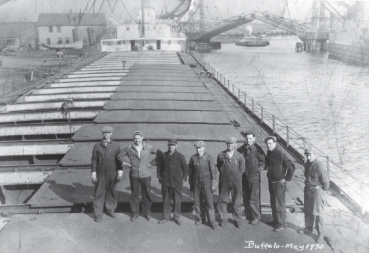
Dad, second from left, with other crew members aboard ship in Buffalo in 1930, in his early days of shipping
I told him that I couldn't believe that my grandfather would do that, or that my grandmother would allow it. He reminded me that his father had been a railroad conductor, that he grew up when young men still served as apprentices, and that he'd started working on the railroad himself when he was sixteen.
“Times were different then, you know. In fact, my dad was already talking to me about being a plumber, but I didn't want anything to do with that. My mother wanted me to be a music teacher. She had already talked to my piano instructor about working for him and continuing my lessons that summer I first shipped out. I loved the piano, but I was sixteen, and I was up for an adventure. I wanted to go. Growing up in a busy port, the call of the water was pretty powerful to a young man.”
He talked about hearing ships' whistles, and train cars coupling at night. And when the wind was blowing, he could see and feel the dust of the largest ore docks in the world. The waterfront was bustling. It was exciting. He remembered watching the big
boats maneuvering in the busy harbor, gliding under the bridges. In the winter they were laid up in the shipyard, towering over a part of the town. Sometimes he and a friend hiked over just to look at them. They looked important and grand. One summer day they even went over to Duluth, he said, and spent the whole day sitting on the break wall, watching the ships sailing in under the Aerial Bridge and out again over the horizon line.
It was a different world, he said, sailing across vast Lake Superior, learning how to use winches and sounding boards, being part of a crew, landing in different ports and going uptown on adventures with the seasoned sailors. “It was an eye-opener. I had never been out of the Twin Ports before. That's when I stopped using the name Willis and started calling myself Bill,” he chuckled.
He said he loved the fresh smell of the water, the spectacular sunrises and sunsets, and sailing through the stars at night. Everything was bigâthe ship, the noise, the docks, the cargo, even the meals. Landing and casting off, departures and arrivals, there was just something about it, he said. He started as a porter, but he was continually after the mate to get him up to the forward end. By midsummer he finally made it, as a deckhand. “I was all over that ship,” he said.
When he went home to go back to high school in the fall, he felt like kind of a hero to the other kids. Laughing out loud, Dad said, “Especially to Captain McDougall's daughter, I hoped! I was hooked. After that summer, I thought, boy, this is it. Someday I'm going to be up in that pilothouse and sail under the Aerial Bridge as the master of my own ship. Someday, my dad will be proud, and even my mother. Someday I'm going to be like Captain McDougall and have four stripes on my sleeve and be The Old Man.”
I wondered how he had met my mother, if he was away all the time. After he graduated from high school, he said, he did sail full-time. During lay up in the winter, he went to Superior
State Teachers College to give school a try and to make his mother happy. He always ended up shipping out again in the spring, however. He met my mother at school one winter. She was studying to be a teacher, he said, and came over the bridge from Duluth every day. It took a while, he grinned, but eventually he convinced her to take a chance on getting connected with a sailor.
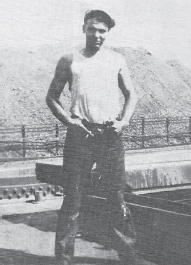
My dad as a young deckhand
I could just hear her saying, “I fell in love with a sailor, not sailing!”
He lifted his arm to smooth down his hair. “What about the snake and the dagger, Dad? I always wanted to ask you about it. It used to scare me when I was little,” I confessed. “When and where did you get it? It never seemed like something you would have.”
He looked at me and then looked out of the porthole, smiled, and said, “Those are the kinds of stories that start, âOnce upon a time a long, long time ago.' All that was a long time ago, Dolly.”
I wanted to ask him more about that time, but I could see that his mood was shifting. He didn't say any more, and I didn't ask any more questions.
At six p.m. we went back for dinnerâcold cuts tonight. At seven-thirty we climbed up to the pilothouse together. He checked the weather again. He rang up the chief to give him the latest update, and then he called the mate and told him to get
out the tarps and have the crew start battening down the hatches. As I watched the men unrolling and clamping down the heavy black canvas tarps to ward off leakage in case of a heavy sea, I saw a jagged burst of lightning out of the corner of my eye. It cut a yellow line through the black sky in the west, and then came a crack of thunder. The wires on the mast started to bang together in the rising wind. I shivered, wondering how severe the weather was going to be.
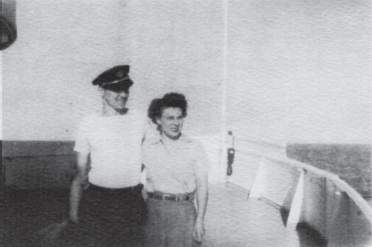
Mom and Dad, then a second mate, aboard the SS
James Pickands
“Are you ever afraid, Dad?” I asked.
It didn't seem like he heard me. His eyebrows narrowed as he walked over to the chart desk. He pulled out the drawer and drew out the chart of Lake Erie. Putting it on top of the desk, he got out the big magnifying glass, the quadrant, and the slide rule. He lit a pipe, squinting out the window at the sky and then down at the radar. He was working now, but a few minutes later I heard him mutter, “When you're in the midst of it, you're too busy to be afraid. Can't think about being afraid until it's over.”
At eight p.m. we threw off our lines and started on our way
back up to the Soo, hoping to get ahead of the storm. For a few moments, behind us, a sunbeam broke through the gathering clouds and shone golden on downtown Toledo.
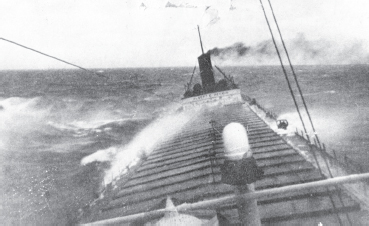
The ship in a rather common state of “rolling”
About eleven p.m., we got some heavy wind and rolled steadily for about an hour, but the brunt of the storm veered north and missed us.
“Pretty lucky this time,” Dad told everyone at breakfast.
We finished our last trip together in fair weather.
Eventually, I married, moved away, and had a family. At the age of sixty-three, unable to climb the ladder anymore, my father retired. He and my mother moved to Tucson, Arizona, for a new kind of life. I was relieved to have them safely there, away from the sailing life. But that life
was
their life, and though far from water, my father, “The Old Man,” once more drifted out to sea.
We were visiting for Easter. We had just finished our dinner and were getting up to go into the kitchen to dye Easter eggs. Everything was already set up on the kitchen tableâa dozen boiled eggs, cups of different-colored dyes, and little decals of chickens and bunnies and ducks. Dad, however, stayed seated and surprised us by launching into a story. He began talking as if he were addressing an unseen audience.
“It was just after Easter that year, our first trip upbound in the spring, and we got into a blinding snowstorm above the Soo. There was a sixty-mile-per-hour wind and twenty-foot seas, and we were getting blown farther and farther off course.”
Mother looked at me. I looked at my husband, and the three of us sat back down.
The children exchanged glances, silently agreeing that this story might take a long time. On tiptoes, they kept heading into the kitchen and started writing their names on their eggs with the white crayons.
Pointing to an imaginary chart on the tablecloth, Dad said, “I got out the charts and the big magnifying glass, and I started to look for islands or inlets, reading the small numbers on the chart to check the depth. The closest bay, Batchawana Bay, was not an official shipping area, no lines designating shipping lanes anywhere near. But it was our only chance for the lee.”
Beads of sweat began to form on his forehead.
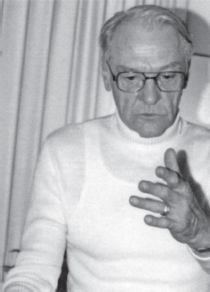
In Tucson, Dad is caught in a spontaneous reflection on his sailing life.
“The waves were beating up the ship pretty badly,” he went on, “and the hatches were starting to take on water. I looked again at the chart and made my decision. It's our only hope, I decided. We've got to try for the bay. I knew that when we turned to go in, the wind would hit us broadside. We'd either ride it out, or we wouldn't. I got on the intercom and told everyone what we were doing, and told them to hang on tight to something, and we started to make the turn.”
Mom began folding her napkin into smaller and smaller squares. Had she heard this story before? I wondered.
“The wind hit us full force on the starboard side,” Dad said. “I hung on for dear life to the ship's telegraph as we kept tipping lower and lower until all I could see was water out of the port side window of the pilothouse,” Dad went on. “We stopped and hovered for a second or two, and then a rogue wave bounced off the
rocks and tossed us back the other way, rolling us back over on our starboard side. Under my feet it suddenly felt light, and I said to myself, this is it, we're going over, and we just stayed there, pitched over on our side for what seemed like a long, long time.”
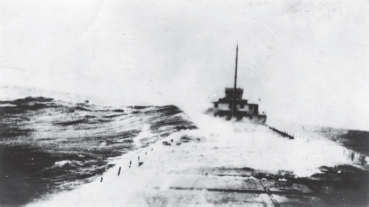
This storm in Batchawana Bay was a classic Lake Superior storm, the likes of which made a lasting imprint on my father's sailing life. The SS
Edmund Fitzgerald
went down with all hands only fifteen miles away from this location in 1975.
The ship's clock in the living room chimed the half hour.
“Suddenly, there was a momentary decrease in the wind,” he went on, “and the ship started to come back, slowly righting itself. A second later, another wave hit us across the stern, and we rode it into the bay. I rang up the chief, who reversed the engines, and the ship finally floated to a stop. We dropped the anchors, and we sat there in a snowstorm all night.”
Just then, the children in the kitchen plopped their eggs into the purple and green cups. One of the eggs inadvertently hit the orange cup, which tipped over, and the orange dye started dripping onto the floor, making a mess. Mom dropped her napkin and jumped up, exclaiming, “Oh, glory, the children!” She dashed into the kitchen, grabbing dishcloths and paper towels, and began cleaning up.
Oblivious to the commotion, Dad continued. “When daylight came and the snow and wind had stopped, I saw that the bay was half a width smaller than it had appeared on the chart, and the ship almost filled it up. I looked at how we had come in through the rocks in the dark. We had made it, but the crew was not impressed.
“When we finally got out of there and made it to Duluth, everyone except the officers quit and got off,” he said. “All those boys went back to the mines on the Range or the farms along the South Shore where they'd been recruited. One severe storm was enough for them. Their sailing days were over.”
In the kitchen, the mess got mopped up. The purple and green eggs came out with the children's names written clearly, and they were delighted.
Dad looked out the glass door at the desert and said, “That was the one time in all my years on Lake Superior that I thought I was going to die.”
I looked up and saw Mom standing in the doorway. She and Dad locked eyes.
“Were you married then?” I asked. “Oh, yes,” Mom said, still looking at Dad. “That was the first spring that he shipped out as a captain. When he got back to Duluth, he insisted we go right downtown, and he bought me my beautiful mink coat.”
The coat in the zipper bag!
I turned to Dad, and now I asked him, “Would you choose the sailing life again, Dad, if you could do it over?”
He looked with pride at the handsome wooden model of his last ship mounted on brass brackets on the wall. Then he turned to Mom, and to me. Looking down at the pale wrinkled snake on his arm, he smiled wistfully, but he didn't say anything. He knew that we knew the answer.
